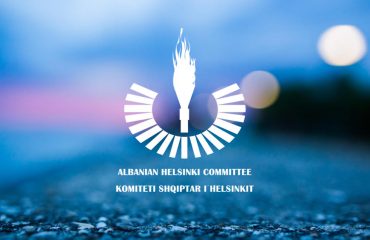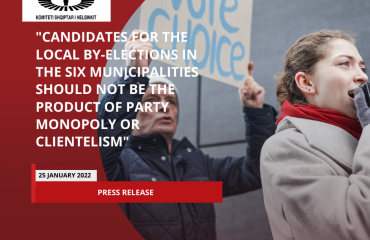As is known, the exercise of the right to elect and be elected represents a fundamental right sanctioned in the constitution and in international acts ratified by our country. This is why the Albanian Helsinki Committee (AHC), pursuant to its mission has been engaged continuously in the monitoring of parliamentary and local government elections, since 1996. The monitoring of elections has also been the subject of activity of other known non-profit organizations in the country.
AHC has followed through the media the progress of some of the developments in the Political Counil on Electoral Reform. AHC hopes that representatives of this Council from the majority, parliamentary and non-parliamentary opposition, through constructive dialogue and consensus, will manage to achieve concrete results that will guarantee free and fair elections, of standards required in keeping with international acts, OSCE/ODIHR recommendations, and the Constitution of the Republic of Albania.
AHC has considered from early on that electoral reform requires broad political consensus and dialogue, transparency, and inclusiveness. It is necessary to take into consideration the OSCE/ODIHR recommendations reflected in the reports on the last four electoral processes, including of June 30, 2019. The key recommendation is the one on the depoliticization of the electoral administration in all levels, one that was not fulfilled in the last local elections either.
AHC has also expressed the concern that in spite of the need for dialogue and broad consensus among different political forces, amendments to the Electoral Code should not be a monopoly of political parties. AHC has called for avoiding formal consultations and for listening effectively to the opinions of groups of interest, experts, as well as representatives of civil society organizations.
Until the end of February of this year, AHC and other civil society organizations became familiar with drafts presented by technical experts of the Parliamentary Committee on Electoral Reform, for which we have presented verbally and in writing some suggestions, in accordance with the time and deadlines for public consultations, which have been relatively narrow.
AHC finds with regret that with the creation of the Political Council, in spite of the importance of this Council bears for as broad as possible dialogue and consensus, every consultation with civil society and other groups of interest was avoided. In fact, the actions were in a very closed manner, except for statements made to the media, by representatives of this Council.
In principle, participation in decision-making processes means opportunity for citizens, civil society organizations, the media, businesses, universities and other stakeholders interested in contributing to the development of policies and laws, which they are directly or indirectly affected from. The participation of citizens through public consultation reflects the level of democratization of a country. A series of international organizations, such as the United Nations, Council of Europe, or European Union, have devoted special importance to the participation of the public in decision-making processes, through the drafting of relevant documents, which not only present the general regulatory principles, but also establish instruments that make respect for these principles compulsory.
AHC notes that the practice pursued by the Political Council on Electoral Reform has not been a just practice, in spite of the good intentions that Electoral Reform be completed as soon as possible. Inclusiveness and consultation, as important principles in a functioning democracy, are indispensable and represent an important pillar for a complete, comprehensive electoral reform, in accordance with standards.




